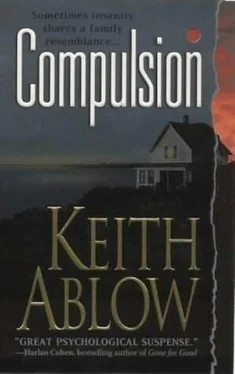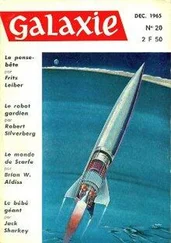"Okay," I encouraged her, "where do you think the thoughts are coming from?"
"My imagination," she said. "They're things I've dreamt up-nightmares during the day. Don't all little girls have funny feelings for their dads?"
Freud did believe that all young girls have unconscious sexual feelings toward the men in their families. But those feelings generally evaporate by adulthood and never fuel serious psychiatric symptoms. I wondered why Lilly's impulses had survived childhood and adolescence intact. Why did they surface on her honeymoon? And why were they so threatening that she had to resist them by doing something as distracting and destructive as injecting herself with dirt?
"Because she couldn't count on anyone else to resist them" the voice at the back of my mind said.
That seemed like the right path to journey down. "How would your grandfather have responded," I asked her, "if you had made the first move?"
"The first move?" she said.
"If you asked him for sex," I said.
A hint of a smile played across her lips. "I don't want to think about it," she said.
"That's always up to you," I said. "But if you choose to confront the thoughts, they may not sneak up on you anymore. You may find you can turn them on and off, without using a needle."
She looked as if she was on the fence about trying.
"Try it for ten seconds. No more," I said.
She looked at me to see if I was serious, then rolled her eyes and shook her head.
"Would he have been angry with you?" I led.
"No," she said. "He was an understanding man."
"Embarrassed?"
She shook her head.
"Shocked?"
She blushed, giggled. "God, I honestly don't know how he would have responded."
Those words, taken literally, sounded like they came directly from the heart of the problem. Lilly couldn't predict whether her grandfather would have taken her as a lover, had she asked him.
Healthy psychosexual development unfolds in an atmosphere in which children know the adults around them would never take them up on their sexual feelings. When a little girl asks her father whether he will marry her, a good answer is, "I'm married to your mother. I love her. Someday I know you'll meet someone who loves you that way." The father (or grandfather) should not respond with a suggestive wink or a playful pat on the backside-or with silence.
Unconsciously fearing that an offer of romance would be accepted by her grandfather, Lilly reacted by burying her sexuality. When it emerged on her honeymoon, it emerged with all the guilt and anxiety of a little girl trying to steal away the man of the house. Her sexual impulses were taboo. Worthy of punishment. Dirty.
"Did he have other women?" I asked.
"Oh, I would think so," she said. "Almost certainly."
"Why do you say that?"
"They argued about it-he and my grandmother. He worked late a lot. Some nights he didn't come home at all. There was a real scene over a woman he had hired as his secretary."
"Did he ever mention these women to you?" I asked.
"I don't think so," she said. "At least not directly. But I knew he was unhappy with my grandmother."
"How did you know that?"
"He used to talk about old girlfriends he dated before he got married. One, in particular. A woman named Hazel. She was Jewish, and my grandfather was Irish Catholic, and that ended that. The times were different. But he told me she was the one he was meant for."
"How old were you when he shared that with you?" I asked.
"Probably eight. Maybe nine." She paused. "Weird, how I remember that."
People often cling to single, vivid childhood memories as symbols of larger psychological issues. By age nine, after all, Lilly knew plenty of toxic facts about Grandpa. He wasn't completely in love with his wife. He was available to other women. Most important, he was willing to share intensely personal, very adult information with her. Perhaps, nine-year-old Lilly might have reasoned, she could one day replace her grandmother and make her grandfather complete. Keeping him content was important, after all, since she had already lost her father.
"It sounds like you don't know what your grandfather would have done, had you offered yourself to him," I told Lilly. "That means he seduced you, without ever laying a hand on you."
"That's so hard for me to believe," she said. "He wasn't mean or predatory. He was… loving."
"I doubt he set out to do you any harm," I said. "But he was empty emotionally and looking everywhere to be filled up-even by the romantic fantasies of his granddaughter. You played along, because that's what little girls do at eight or nine or ten." I let that sink in a couple seconds.
"And that's why I feel so guilty?" she said.
"Yes," I said. "That guilt may have been protective, for a time. When you were little, it may have kept you from getting yourself deeper into a relationship that was bad for you." I leaned closer to the bed. "Now that emotion-the guilt-has outlived its purpose. It's time to let it go."
She glanced at her leg. "What do I do when these images come up, and the feelings come back? Is there something I can take?"
"My opinion might be a little different from what other psychiatrists would tell you," I said.
"Why? What would they say?"
"I think most would tell you to take an antianxiety medication, like Klonopin, or a combination antidepressant/antianxiety medication, like Zoloft. Or both. And you could do that. Your symptoms would decrease or even disappear, at least for a while."
"What would you recommend?" she asked.
"I say, run into the images, not away from them. Find a psychiatrist to help you watch the scenes as they unfold in your mind. My guess is that your guilt will turn pretty quickly to anger. And that's a much easier emotion to deal with."
"Can't I do that work with you?" she asked.
No doubt Lilly wanted to win over every male authority figure she came across. Her grandfather. All her surgeons. Why not a psychiatrist? Her case fascinated me, but I had a chance to demonstrate that I was willing to do the right thing for her, not the gratifying thing for me. Seeing that I, unlike her grandfather, could draw that distinction might be the first baby step on her long journey to recovery. "I'd recommend someone older than I am," I said.
She looked away. "I'm not sure I could open up to anyone else."
"It's someone I have tremendous respect for," I said.
"You said you'd stay with me through this."
Normally, I wouldn't have divulged what I was about to tell her, but I felt that Lilly needed a special, continuing connection with me. Without that, I feared she wouldn't follow up. "I'm referring you to a psychiatrist who helped me," I said. "My own analyst."
She looked at me. "Your own analyst? You'd share him with me?"
"Yes," I said. "I will."
"Who is it?" she asked.
"Dr. Theodore James. He's your grandfather's age."
The PICU was in crisis as I walked through its sliding glass doors. Nurses ran for IV bags, and John Karlstein barked orders from Tess's glass cubicle. Someone had pulled the blinds closed.
Julia was standing in a far corner of the central room, crying, as a nurse tried to comfort her. "Frank!" she yelled when we made eye contact. She ran to me. I held her, her chest heaving so hard she was barely able to speak. "She stopped… breathing. Tess… Please, God."
"Hang a tocainide drip," Karlstein ordered. An alarm sounded on the bank of monitors at the nurses' station. I looked over and saw Tess's tracing had gone flat. "Hold the drip. We're going to shock her again," Karlstein yelled. "Stand back!"
Julia crumpled in my arms. "No!" she pleaded. "Frank, please help."
I eased Julia into a seat by the unit secretary's desk, with no view of Tess's room, and motioned for the nurse. "Stay here," I told Julia, as the nurse arrived. "I'll find out what's happening."
Читать дальше












